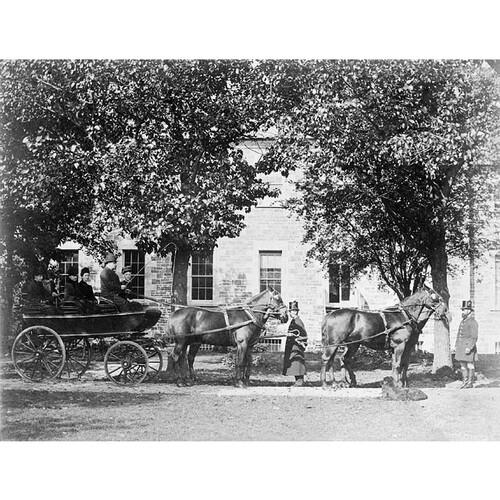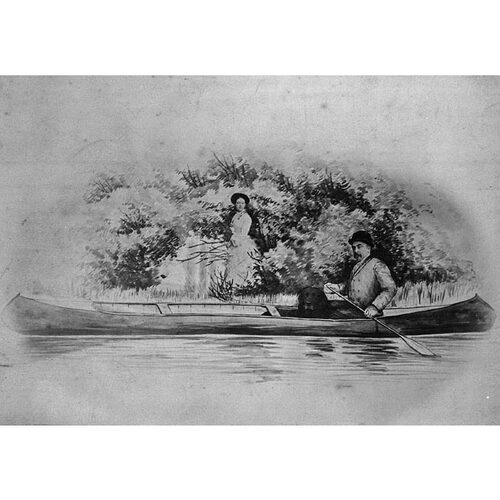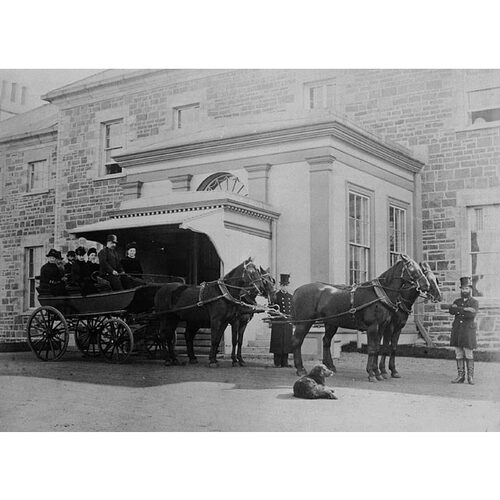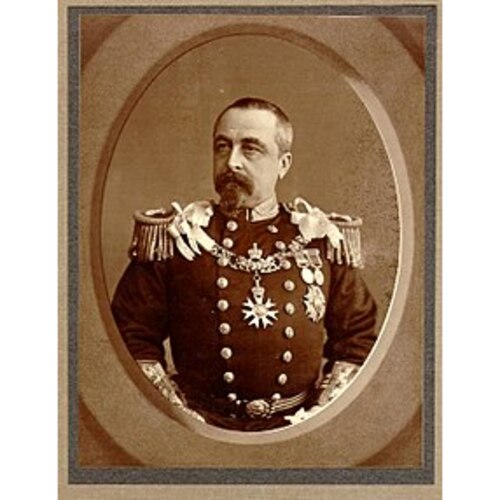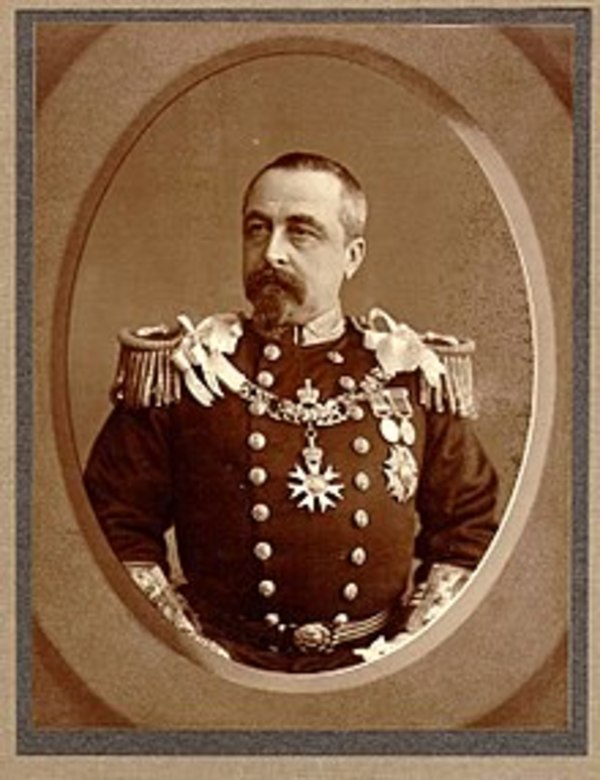
Source: Courtesy of Wikimedia Commons
GLOVER, Sir JOHN HAWLEY, naval officer and colonial administrator; b. 24 Feb. 1829 at Yateley, Hampshire, England, son of the Reverend Frederick Augustus Glover and Mary Broughton; m. November 1876 Elizabeth Rosetta Scott, and they had at least one child; d. 30 Sept. 1885 in London, England.
John Hawley Glover’s father had planned that his son would enter the Royal Engineers but instead, with the help of his mother, the daughter of an admiral, he joined the Royal Navy on 4 Dec. 1841 as a first class volunteer serving under Admiral Sir Edward Campbell Rich Owen. Glover’s prospects were bright, but the sudden death of his mother and his estrangement from his father when the latter quickly remarried deprived him of the essential financial means to further his career. Withdrawal from naval service was, however, avoided when Owen encouraged Glover to enter the Surveying Branch; he joined it in May 1842 and with his pay was able to support his own advancement. Until 1852 he served on surveying ships in the Mediterranean and along the west coast of Africa. In 1853 Glover took part in the war in Burma and was mentioned twice in dispatches. After his recovery from a wound received in Burma, surveying duties took him to the Baltic and to the Elbe and Weser rivers until March 1857 when he was sent with the Niger expedition to survey the lagoons at Lagos and a portion of the Niger River. His career at sea ended in 1862 with the completion of this tour and with his advancement to the rank of commander at the age of 33. He was later placed on the retired list, and in 1877 promoted captain.
On 21 April 1863, Glover was appointed administrator of Lagos; in 1864 he became colonial secretary of the colony, and in 1866 he again assumed the duties of administrator until 9 July 1872. In his second term as administrator he was actively involved in suppressing marauding Ashantis, and in 1873 he volunteered to serve against the Ashantis when war appeared imminent. His instructions were to raise a native force with which to act at his discretion under the leadership of Sir Garnet Joseph Wolseley*; with Hausa tribesmen he accompanied the main force proceeding into the Ashanti country, and showed skill in raids and movement of military supplies. He was largely responsible for the peace reached on 14 Feb. 1874 and received the thanks of the British parliament and a gcmg for this service. His actions were long remembered by the Hausas.
Glover was offered the post of governor of Newfoundland on Christmas Eve 1875 and he arrived there on 7 April 1876. The colony, he found, had matured considerably since the rowdy days following the opening of the first legislature in 1833 under Governor Thomas John Cochrane*. The Liberal premiers Glover worked with during his terms in office, 1876–81 and 1883–85, Frederic Bowker Terrington Carter* and William Vallance Whiteway* respectively, were both talented men and prominent lawyers, who ably guided Glover in his administration of the colony. During Glover’s first term, Carter and particularly Whiteway sought to diminish external influence over the colony’s affairs and policies.
The French government was aware that its hold on the west coast, also called the French shore, depended upon the restriction of private and commercial settlement and complained to the British government at every attempt by Newfoundland to place settlers on it. Nevertheless, by the time Glover left Newfoundland in 1881, the colony had made significant progress towards control of the west coast. In 1877 Commander William Howorth became the first magistrate on the west coast appointed by Newfoundland and customs officers began collecting dues for use by the colony. The area gained representation in the assembly in 1881 and France conceded the right “in principle” for the Newfoundland government to make land grants for settlement, mining, and industrial enterprises in the same year. These changes were representative of the substantial easing of British control over the colony. The greatest threat to French ambitions was the Railway Act of 1880 which provided for the construction of a line to run from St John’s to Halls Bay, a mining region in Notre Dame Bay. This railway would connect the centres of population, open land in the valleys of the Gambo, Gander, and Exploits rivers, and facilitate lumbering and mining operations in the interior. The government hoped to continue the line all the way down the west coast to Port aux Basques where it would connect by ferry with the mainland railway system, but after complaints to Britain from the French government, the imperial government forced the colony to accept the shorter line to Halls Baet for the colony, overly dependent upon the fishery, the diversification promised by the completion of the Longer railway was too strong a need to be denied forever.
Glover, at first unaccustomed to the complexities of responsible government, soon adopted a policy of following the advice of his ministers in colonial matters while trying to prevent a serious breach with the home government which had the responsibility for fishery treaties with France. The Newfoundlanders’ success with the French shore problem eased the political atmosphere in the colony, and made the positions of the governor, British naval personnel, and officers on the treaty coast less onerous. The governor’s role of liaison between the colony and the home government was also aided in 1878 by the satisfied feeling in Newfoundland following the negotiation by Whiteway of an award from the Halifax Commission: Newfoundland received $1 million as its share of funds paid by the United States to Great Britain as compensation for advantages gained in the Atlantic fisheries through the Treaty of Washington in 1871.
Glover was happiest when travelling throughout the island with his wife. Together they visited fishermen’s homes, inspected working establishments, ventured down mines, and holidayed in popular resorts and remote outports. Glover was the first governor to cross a large part of the island when in 1878 he went on a two-month trip between Halls Bay and the Bay of Islands accompanied by the famous geologist, Alexander Murray, and, for part of the way, by Moses Harvey*, a clergyman and historian who published Across Newfoundland with the governor the following year. Glover thus knew more about the people and the personalities of the colony than many of the government ministers. When he opened the legislature in 1879 he could say with conviction that he had been impressed with the agricultural resources and forest lands in the western part of the island which would attract settlers; it afforded “such facilities for the construction of a main highway that this great work might be accomplished at a very modest cost.” The speech was a mixture of truth and exaggeration, which presaged the railway age of Newfoundland.
On a visit to England during the London season of 1881, Glover accepted the governorship of the Leeward Islands and was instructed to travel there quickly because of urgent problems. Sir Henry Berkeley Fitz-Hardinge Maxse succeeded him in the autumn of 1881. The Glovers were not reluctant to leave Newfoundland; they were equally content to depart from the Caribbean in 1883. Sir John contracted malaria in Antigua, and while waiting for a better posting, rested in Germany, Ireland, and England. Maxse, who had arrived in Newfoundland in poor health, died in September 1883 and the colony was without a governor at a time when negotiations with France over fishery treaty rights were taking place. The Colonial Office persuaded Glover to take up the governorship) again for a short term. Before going to St John’s, he went to Paris to participate in the treaty talks, acting in an advisory capacity to the British ambassador. This visit enabled him to nurse his health further and when the negotiations were over Glover took a holiday in Sussex. He received an urgent message in late May 1884 from Premier Carter asking him to come to Newfoundland immediately to deal with colonial matters so that Carter could fulfil his obligations as chief justice and preside at the trials of Roman Catholics charged with the murder of several Protestants during riots at Harbour Grace in 1883. Despite the religious tension in the colony, Glover was well received when he arrived in June accompanied by two Colonial Office officials who were sent to persuade the government of Newfoundland to accept the terms of the recent Paris negotiations.
Glover stayed in Newfoundland long enough to see the latest French shore terms rejected by the colony and the completion of the railway to Harbour Grace, the second largest community on the island. In late 1884 he and Lady Glover opened the new graving docks in the St John’s harbour. Glover, however, had not fully recovered his health and he collapsed on 2 March 1885. Rest cures in Topsail, Nfld, and in Homberg (Federal Republic of Germany) did not help him and he died at his home in London on 30 Sept. 1885. A monument was later raised to his memory in St Paul’s Cathedral, London, with a replica in the Anglican Cathedral of St John the Baptist in St John’s, completed during Glover’s second term.
In her private diary Glover’s wife has provided considerable background detail to his career of a kind not normally included in political histories. She considered the proper role of her husband as paterfamilias to backward and primitive colonies, a view which was condescending but not without truth. However, in Daniel Woodley Prowse*’s judgement, “No more honourable, generous, kind hearted, or active ruler ever presided over our government.”
PRO, CO 194/193–202, 194/248. Royal Commonwealth Soc. (London), Sir John Hawley Glover papers. Moses Harvey, Across Newfoundland with the governor: a visit to our mining region; and this Newfoundland of ours: being a series of papers – the natural resources and future prospects of the colony (St John’s, 1879). Illustrated London News, 25 April 1874. Times and General Commercial Gazette (St John’s), 2 Oct. 1885. The annual register: a review of public events at home and abroad (London), 1885. DNB. G.B., Adm., Navy list, 1874–86. Henry Brackenbury, The Ashanti war; a narrative prepared from the official documents by permission of Major-General Sir Garnet Wolseley, C.B., K.C.M.G. (2v., London, 1968). J. K. Hiller, “A history of Newfound land, 1874–1901” (phd thesis, Univ. of Cambridge, Eng., 1971). E. R. [Scott] Glover, Life of Sir John Hawley Glover, R.N., G.C.M.G., ed. Richard Temple (London, 1897); Memories of four continents: recollections grave and gay of events in social and diplomatic life (London, 1923). F. F. Thompson, The French shore problem in Newfoundland: an imperial study (Toronto, 1961).
Cite This Article
Frederic Fraser Thompson, “GLOVER, Sir JOHN HAWLEY,” in Dictionary of Canadian Biography, vol. 11, University of Toronto/Université Laval, 2003–, accessed March 1, 2026, https://www.biographi.ca/en/bio/glover_john_hawley_11E.html.
The citation above shows the format for footnotes and endnotes according to the Chicago manual of style (16th edition). Information to be used in other citation formats:
| Permalink: | https://www.biographi.ca/en/bio/glover_john_hawley_11E.html |
| Author of Article: | Frederic Fraser Thompson |
| Title of Article: | GLOVER, Sir JOHN HAWLEY |
| Publication Name: | Dictionary of Canadian Biography, vol. 11 |
| Publisher: | University of Toronto/Université Laval |
| Year of publication: | 1982 |
| Year of revision: | 1982 |
| Access Date: | March 1, 2026 |


